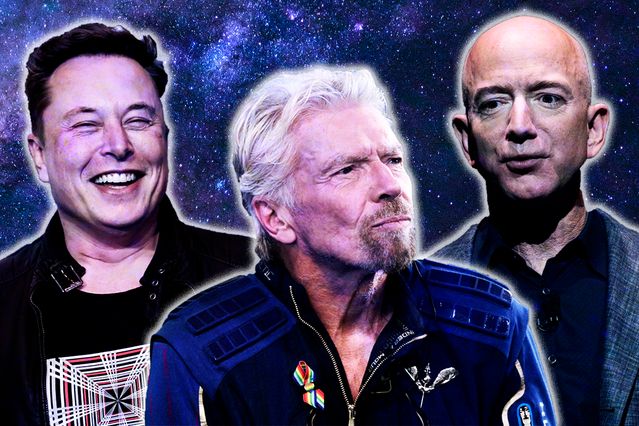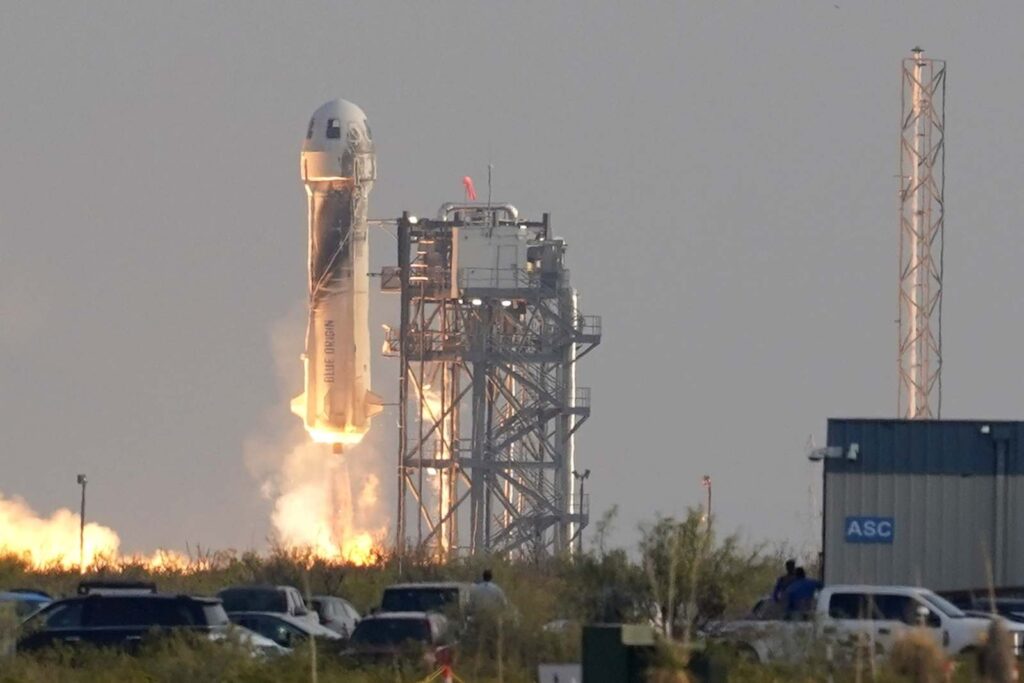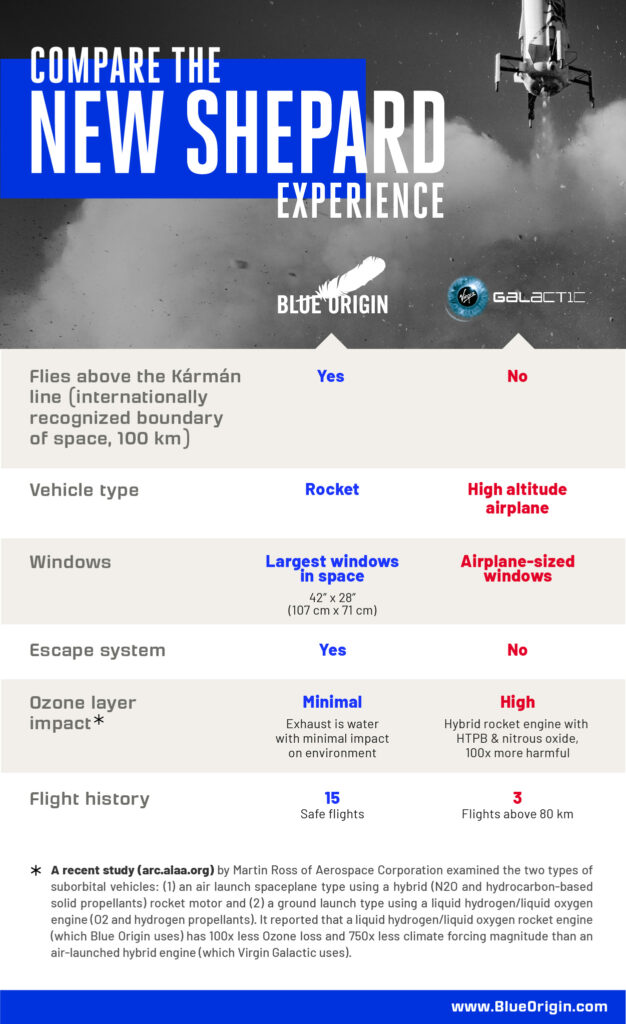
The past two weeks has been an exciting time for Earth’s super-wealthy, as first Richard Branson then Jeff Bezos blasted off to space aboard their fancy rocket planes.
On July 20, the 52th anniversary of Apollo 11’s very first moon landing, Jeff Bezos, billionaire founder of Amazon and Blue Origin, successfully completed his trip to the suborbital frontier on his company’s New Shepard craft. This was also Blue Origin’s first passenger spaceflight— a landmark moment for both the company and the space tourism industry. The three other crew members were Jeff’s brother Mark, 18-year-old Dutch teen Oliver Daemen, whose father paid for the trip, and 82-year-old aviator Wally Funk, who trained to be an astronaut in the 1960s, but was denied the opportunity because she was a woman.
The autonomous New Shepard, which consists of a reusable rocket topped by a capsule, blasted off at 9:12am Tuesday morning at a launchpad in west Texas, carrying the four passengers to 66.5 miles (107 kilometers) above Earth, where the capsule floated in weightlessness for approximately three minutes, providing the crew with a breathtaking view of our planet.
“Blue Control, Bezos. Best day ever!” Bezos said while in flight.
But Bezos isn’t the only billionaire who has eyes on the skies. He was beat to the punch by Sir Richard Branson, English business magnate and founder of the Virgin Group, whose maiden voyage into space aboard Virgin Galactic’s VSS Unity spacecraft took place on July 11th, nine days before Bezos.
It’s more than brilliant PR. The sight of these aerospace company CEOs climbing into rockets could be a sign of what’s to come.

Blue Origin vs. Virgin Galactic
Two days before Branson’s scheduled flight, Blue Origin posted an infographic on Twitter, pointing out the differences between the two space vehicles.

The New Shepard took off from a launchpad like a conventional rocket, while Virgin Galactic’s VSS Unity was dropped from under a specially designed aircraft at about 50,000 feet before firing its ascent engines. New Shepard’s booster also returned to the pad for a soft touchdown so that it can be reused later, while the capsule carrying its crew landed in the Texas desert using braking rockets and parachutes.
But the most discerning fact of all is that New Shepard gets above the Kármán line, the 62-mile-high mark that is often regarded by experts as the boundary of space. Peaking at around 282,000 feet, Virgin Galactic’s spaceplane doesn’t quite get there.
“From the beginning, New Shepard was designed to fly above the Kármán line so none of our astronauts have an asterisk next to their name. For 96% of the world’s population, space begins 100 km up at the internationally recognized Kármán line,” Blue Origin tweeted.
“Only 4% of the world recognizes a lower limit of 80 km or 50 miles as the beginning of space. New Shepard flies above both boundaries. One of the many benefits of flying with Blue Origin.”
But while the entire world watched this spectacle unfold with bated breath, many remain unimpressed.
“Class warfare is Jeff Bezos, Elon Musk and Richard Branson becoming $250 billion richer during the pandemic, paying a lower tax rate than a nurse and racing to outer space while the planet burns and millions go without healthcare, housing and food.” Wrote Warren Gunnels, a staffer for Bernie Sanders.
Bezos also drew criticism from labor groups for thanking Amazon’s workers for funding his trip, which came as no surprise, since Amazon has long been under fire for mistreating its employees. Over the past years, a grim pattern of workplace safety issues have landed the company on a list of the country’s most dangerous employers. Many have suffered serious injuries, and warehouse staff were reportedly placed on such demanding schedules that they were forced to urinate and defecate in bags.
When asked by “TODAY” anchor Hoda Kotb to respond to claims that he and other billionaires, like Richard Branson, are just “rich guys on a joy ride” to space, Bezos said he’s traveling to space to help build “infrastructure” for future generations.
“We have lots of problems here and now on Earth and we need to work on those and we also need to look to the future, we’ve always done that as a species and as a civilization. We have to do both.”
Dawn of a new Space Age?
We often hear astronauts say their journey to space made them realize how insignificant humans beings are, and this epiphany helped them become more sensitive and altruistic people. Will the same thing happen to these billionaires? We don’t know.
What we do know is that Blue Origin is currently building a larger, more powerful reusable rocket called New Glenn — after John Glenn, the first American to orbit Earth. Virgin Galactic, on the other hand, says it aims to launch as many as 400 suborbital flights per year, carrying up to six passengers and two pilots each, departing from and landing at the Spaceport America home base in New Mexico.
“We are really just on the cusp of seeing the activity of commercial human space flight,” says Commercial Spaceflight Federation President Karina Drees. “Future generations are going to look at this moment as a pivotal moment for humanity when it comes to the expansion into space.”
And it’s not just CEOs who are buckling up either. According to reports, 600 people have already reserved $250,000 tickets to fly to space with Virgin Galactic, including Tom Hanks, Leonardo DiCaprio and Justin Bieber.
So here’s a question to contemplate. Who would you like to liftoff to space with: Jeff Bezos, Elon Musk, Richard Branson or Lady Gaga? Leave your thoughts in the comment section below, or click here to watch Jeff Bezos launch into space on Blue Origin’s New Shepard rocket.